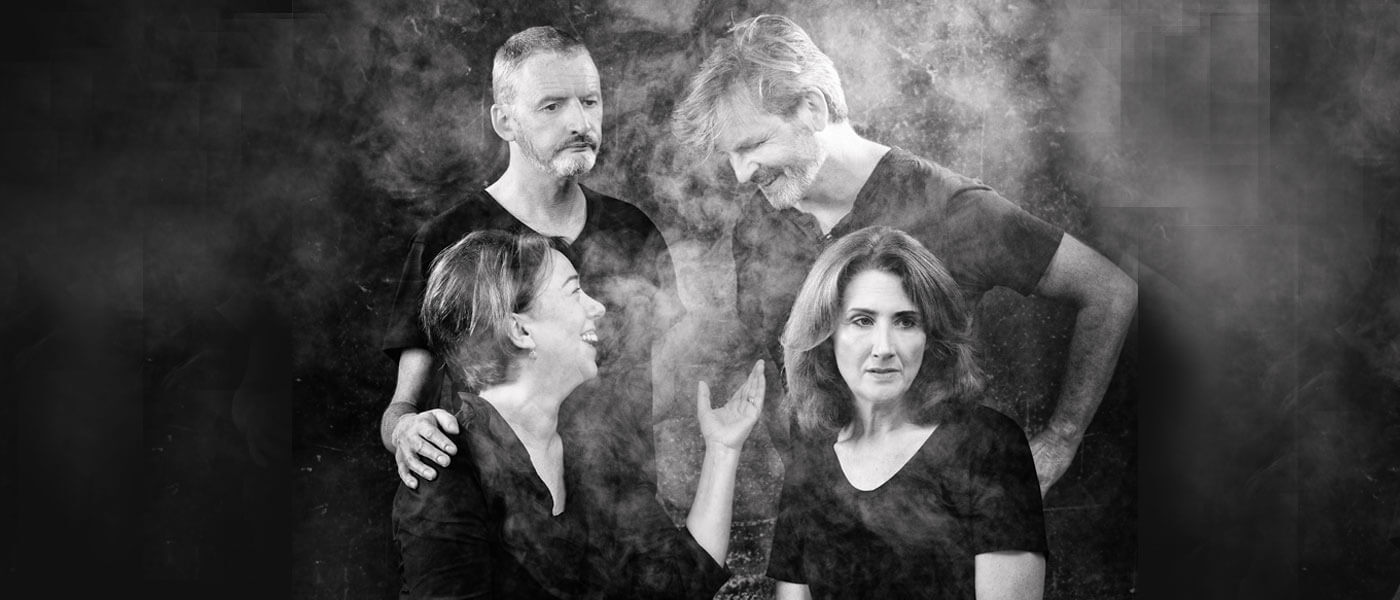
It appears, if one judges it solely from the theatre, that the middle classes do nothing but invite people to dinners that promptly descend into anarchy. This rather tired dramatic trope achieved its zenith in Edward Albee’s Who’s Afraid of Virginia Woolf and was enjoyably ridiculous in Yasmina Reza’s God of Carnage. It can be seen everywhere, from operatic and musical treatments of Bunuel’s The Exterminating Angel, to across the road at the Gate’s production of Tribes. It is the default manner of displaying that the middle classes are not quite so civilised as one might expect. However, given the proliferation of food, drinks and savage critiques thrown across tasteful dining rooms onstage, one might wonder if the middle classes were ever civilised to begin with.
Such is the slightly uninspired crux of Fire Below, Owen McCafferty’s companion piece to his successful Quietly, which explores how the “other half” lives in Belfast. Gerry and Rosemary are comfortable empty-nesters and ex-Catholics who invite their pleasant, nominally Protestant neighbours, Tom and Maggie, over for drinks one evening. The real hook of the story is that it occurs on a hill above a Protestant housing estate, where the 11th-night bonfire is taking place below. McCafferty’s title is particularly apt in suggesting, not only the physical bonfire taking place, but also the resentments between Protestants and Catholics which may not be as extinguished as everyone might like to think.
That these resentments will eventually spill out into savage conflict is inevitable, and McCafferty does a good job of maintaining a level of dramatic tension, only to drop the Israel-Palestine conflict into the play in the final 15 minutes. The resulting antagonism is extreme and puts the couples rather too neatly on pro-Israeli and pro-Palestinian sides.
The strongest part of the piece is undoubtedly the four actors, each giving performances that are distinctly and subtly different. Frankie McCafferty, as Gerry, gives a particularly real performance as a warm-hearted curmudgeon, while Cara Kelly, as Rosemary, brings to life an instantly recognisable older woman who is still young at heart. Ruairi Conaghan has a slightly harder time as the straight-talking Tom, who gets landed with the most on-the-nose of the play’s lines – the couples’ disdain for the working classes is not so much an undercurrent of prejudice as it is a baldly stated contempt – and Ali White plays perhaps the most vapid of the four, but both are funny and relatable.
Jimmy Fay’s direction is, at times, a tad didactic, as the couples savage a packet of Parma ham while commenting on the incivility of those below them, and draws lines between the couples easily. Sinead McKenna’s lighting design is wonderfully atmospheric, although the panels projecting overhead trees on the back wall adds very little. Paula McCafferty’s set design serviceably conjures a well to do patio, as does Una Hickey’s costume. The real heart of the piece, however, comes in its end, as McCafferty offers us the possibility that even the most broken of friendships may be rekindled.






